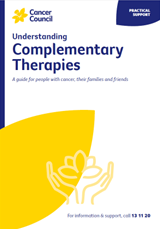- Home
- About Cancer
- Living well
- Complementary therapies
- What are complementary therapies?
What are complementary therapies?
In this section we look at the difference between conventional medicine, complementary therapies and alternative therapies.
Learn more about:
For your community
Conventional treatments and medicines
These can be used to remove the cancer, slow or stop the growth and spread of the disease, or provide relief from symptoms. Conventional medical treatments for cancer include surgery, radiation therapy (also known as radiotherapy) and drug therapies (such as chemotherapy, hormone therapy, targeted therapy and immunotherapy).
Conventional medical treatments are based on scientific evidence and have been through a research process to see whether they work and are safe. This is known as evidence-based medicine. New treatments are first tested in laboratories and then on large groups of people in clinical trials.
Complementary therapies
These are said to focus on the whole person, not just the cancer. They include practices like massage and yoga, as well as medicines that you swallow or apply to the skin. Complementary therapies are used with conventional medicines, and may help people cope better with the physical and emotional impact of cancer, as well as side effects caused by conventional cancer treatments. There is no evidence complementary therapies can treat or cure cancer itself.
While some complementary therapies are supported by strong evidence, many others are not. Some are being scientifically tested to see:
- whether they are safe for people with cancer
- whether they improve specific symptoms and treatment side effects
- how they interact with conventional cancer treatments.
“Complementary” versus “alternative” therapies
People often use the terms “complementary” and “alternative” as though they mean the same thing. Although they are sometimes combined into one phrase – complementary and alternative therapies – they are different.
Complementary therapies – These are widely used alongside conventional medical treatments, usually to manage side effects of cancer or its treatment. Some complementary therapies have been scientifically researched to show that they are generally safe and effective to use in people with cancer.
Complementary therapies that are commonly used alongside conventional cancer treatments are discussed in this section.
Alternative therapies – These are used instead of conventional medical treatments. Cancer Council does not recommend the use of alternative therapies as a treatment for cancer.
Many alternative therapies have not been scientifically tested, so there is no proof they stop cancer growing or spreading. Others have been tested and shown to be harmful to people with cancer or not to work. While side effects of alternative therapies are not always known, some are serious and may prevent successful treatment of the cancer.
Some alternative therapists promote their therapies and medicines as a cure for cancer, and encourage people to stop using conventional cancer treatment. If this is something you are considering, please discuss this with your doctor and cancer care team first. Delaying conventional treatment to use an alternative therapy can allow the cancer to grow or make it harder to treat when you start conventional treatment. It may also mean that you are not well enough for conventional treatment.
Alternative therapies can be very expensive, and they are not covered by government-funded schemes such as Medicare or the Pharmaceutical Benefits Scheme (PBS). It is important to consider the cost of these therapies.
More information – If you have questions about complementary or alternative therapies, talk to your doctor or call Cancer Council 13 11 20.
→ READ MORE: Key questions about complementary therapies
Video: What are complementary therapies?
Meditation and Relaxation Podcast
Listen to more of our meditation and relaxation podcast for people affected by cancer
More resources
Dr David Joske, Clinical Haematologist, Sir Charles Gairdner Hospital and PathWest, Chairman and Founder Solaris Cancer Care Foundation, Clinical Professor of Medicine, The University of Western Australia, WA; Australasian Integrative Medicine Association (AIMA); Dr Robert Blum, Clinical Director, Cancer Services, Bendigo Health, NSW; Sally Brooks, Senior Pharmacist, Medicines Information, Peter MacCallum Cancer Centre, VIC; Dr Suzanne Grant, Senior Research Fellow, NICM Health Research Institute, Western Sydney University, and Chris O’Brien Lifehouse, NSW; Prof Danforn Lim, Adjunct Professor and Advisory Board Member, NICM Health Research Institute, Western Sydney University, and Adjunct Professor, UTS, NSW; Christina Line, Statewide Services Senior Coordinator, Cancer Council WA; Jen McKenzie, Physiotherapist (Lymphoedema) and ESSA Accredited Exercise Physiologist, The McKenzie Clinic, QLD; Simone Noelker, Wellness Centre and Pastoral Care Manager, Ballarat Regional Integrated Cancer Centre, VIC; Dr Nirzari Pandit, General Practitioner, RACGP Specific Interests Integrative Medicine Group, NSW; Georgie Pearson, Consumer; Cris Pirone, Counsellor, Cancer Council SA; Dr Elysia Thornton-Benko, Specialist General Practitioner, and UNSW Research Fellow, NSW; Kirsty Trebilcock, 13 11 20 Consultant, Cancer Council SA.
View the Cancer Council NSW editorial policy.
View all publications or call 13 11 20 for free printed copies.

